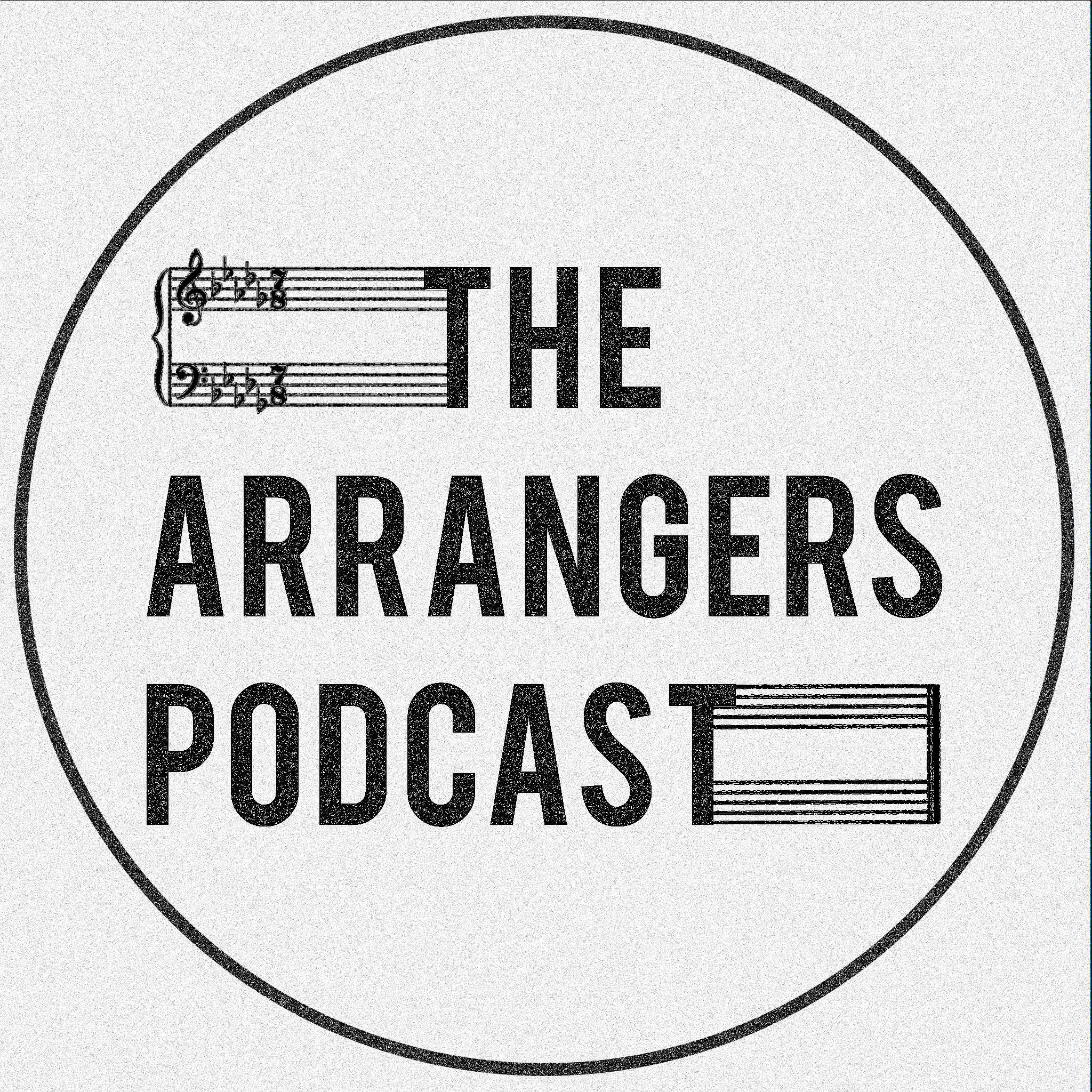
23.2K
Downloads
34
Episodes
The Arrangers Podcast is a show dedicated to insightful discussion about the art, craft, and business of music arranging and composition.
The Arrangers Podcast is a show dedicated to insightful discussion about the art, craft, and business of music arranging and composition.
Episodes

Monday May 22, 2017
The Arrangers Podcast Ep. 4: David Berger Interview (Part 1)
Monday May 22, 2017
Monday May 22, 2017
This episode features special guest David Berger in an interview conducted by Aaron and Drew. David talks about his upbringing in music and his professional experience as a prolific and highly influential arranger, composer, transcriber, bandleader and educator.
Show Notes
Correction: David's arranging book is called Creative Jazz
Composing and Arranging and can be found here
David Berger's website:
https://www.davidbergerjazz.com/
Such Sweet Thunder Music:
https://www.suchsweetthundermusic.com/
David Berger's blog:

Monday May 08, 2017
The Arrangers Podcast Ep. 3: Overwriting or Underwriting?
Monday May 08, 2017
Monday May 08, 2017
Aaron and Drew discuss the common issues of writing too many notes, leaving too much space, and the challenge writing with the perfect balance for every situation. They discuss what music they've been listening to as well.

Monday Apr 24, 2017
The Arrangers Podcast Ep. 2: Artistic Voice
Monday Apr 24, 2017
Monday Apr 24, 2017
Aaron and Drew discuss the elusive concept of what it means to have a personal artistic voice as a writer.

Thursday Apr 06, 2017
The Arrangers Podcast Ep. 1: Introduction/Q & A
Thursday Apr 06, 2017
Thursday Apr 06, 2017
Aaron and Drew introduce themselves and answer a handful of questions from the community.
Show Notes
Intro Music: "Pistachio" by Drew Zaremba, recorded by the University of North Texas One O'Clock Lab Band
https://music.unt.edu/store/lab-2015
Ending Music: "Take Your Time" by Aaron Hedenstrom, recorded by the University of North Texas One O'Clock Lab Band
https://music.unt.edu/store/lab-2016
Index/Questions
Introductions (0:32-04:28)
Drew's Story (04:28-07:47)
Drew's site: http://drewzaremba.com/
Aaron's Story (07:47-12:46)
http://www.aaronhedenstrom.com/
Q and A (13:10)
Question 1 (13:58)
- Paul Birk: When arranging, do you find it helpful to do a 3-line sketch of your ideas, designating lead lines and accompanimental figures within a form before actually scoring the arrangement?
Question 2 (21:09)
- Justin Pierce: As an arranger, what are your favorite books/transcriptions/exercises to practice on piano?
- The Jazz Piano Book by Mark Levine
- Piano Intro (Bobby Tucker): "I Loves You Porgy" Billie Holiday
- June Lee: https://www.youtube.com/user/war3gate
- Jacob Collier: http://www.jacobcollier.co.uk/
- Inside the Score by Rayburn Wright
- Jazz Composition and Arranging in the Digital Age
- Michael Abene
- Richard Sussman
Question 3 (26:10)
- Cole Dapprich: What is the best way to handle doubling in an arrangement, specifically in Finale 2012 or 2014? How do I switch a part to a double and then back within the same file?
Question 4 (27:38)
- Toshi Clinch: How do you work out the price of a commission for a client?
- Gordon Goodwin: http://www.bigphatband.com/
- Brett McDonald: BrettMcMusic
Question 5 (36:05)
Toshi Clinch: When selling your own arrangements, how do you decide on the price?
- Legality of selling arrangements: http://ostrowesq.com/no-you-dont-own-your-arrangement-of-that-hit-song/
- ASCAP: https://www.ascap.com/
- BMI: https://www.bmi.com/
Question 6 (38:18)
Toshi Clinch: What tactics do you have when you have writer's block but still have to meet a deadline?
- Sharp-9 chord: https://en.wikipedia.org/wiki/Dominant_seventh_sharp_ninth_chord
- The Unity Orchestra: http://drewzaremba.com/unity-orchestra/
Question 7 (43:50)
Toshi Clinch: How often do you find yourself following general arranging rules when writing, and how often do you find yourself breaking away from those rules?
- Aleatoric Music: https://en.wikipedia.org/wiki/Aleatoric_music
- Doritos Sponsorship: https://sponsorpitch.com/sponsors/doritos
Question 8 (50:29)
Toshi Clinch: As a professional arranger, how often do you work on your own material vs. working on material for others?
- Drum and Bass music: https://en.wikipedia.org/wiki/Drum_and_bass
- The Tortured Artist Stereotype: https://en.wikipedia.org/wiki/Tortured_artist
Question 9 (55:35)
Toshi Clinch: How do you go about finding arranging work and maintaining a consistent workload?
- Aaron Hedenstrom Orchestra: Aaron Hedenstrom Orchestra: A Father's Love
- Drew Zaremba Big Band: http://drewzaremba.com/tag/big-band/
- S. Carey: http://scarey.org/
- Eaux Claires Festival: http://eauxclaires.com/
- UW Eau Claire Jazz Ensemble: http://www.uwec.edu/academics/college-arts-sciences/departments-programs/music-theatre-arts/academic-offerings/ensembles/jazz-studies/
Question 10 (1:06:12)
Chris Sharpe: What factors do you take into consideration when making an instrumental arrangement of music originally written with text? Do you feel the need to compensate for the lack of text?
- Night and Day (Cole Porter): Night And Day - Cole Porter
- Morse Code: http://morsecode.scphillips.com/translator.html
- But Not For Me (George and Ira Gershwin)
- Ella Fitzgerald version: Ella Fitzgerald - But Not For Me
- Harry Connick Jr. version: But Not for Me
Question 11 (1:09:22)
Camille DeVore: What are your schematics for setting up an arranging workstation (with regards to gear)
- MIDI controller: https://www.sweetwater.com/c513--MIDI_Controllers
- Macbook Pro: https://en.wikipedia.org/wiki/MacBook_Pro
- Audio Interface: https://www.sweetwater.com/shop/computer-audio/audio_interfaces/
- Studio Mixing Monitors: https://www.sweetwater.com/c405--Active_Monitors
- External Hard drives: https://www.amazon.com/External-Hard-Drives-Storage-Add-Ons/b?ie=UTF8&node=595048
- Computer Monitors: https://www.amazon.com/s/ref=nb_sb_noss_2?url=search-alias%3Delectronics&field-keywords=computer+monitor&rh=n%3A172282%2Ck%3Acomputer+monitor&ajr=0
- Staff Paper: https://www.amazon.com/s/ref=nb_sb_noss_2?url=node%3D1292115011&field-keywords=manuscript+paper&rh=n%3A1292115011%2Ck%3Amanuscript+paper
- Sibelius Software: http://www.avid.com/sibelius
- Finale Software: http://www.finalemusic.com/
- Dorico Software: https://www.steinberg.net/en/products/dorico/start.html
- Musescore Software (FREE): https://musescore.org/
- Logic Pro X Software: http://www.apple.com/logic-pro/
- Pro Tools Software: http://www.avid.com/pro-tools
- Ableton Live Software: https://www.ableton.com/en/
- Gear Acquisition Syndrome: http://www.homestudiocorner.com/gear-acquisition-syndrome/
- DAW (Digital Audio Workstation): http://www.musicradar.com/tuition/tech/the-20-best-daw-software-apps-in-the-world-today-238905
Question 12 (1:15:00)
Scott Neary: I would love to know how you break into the world of commission writing, arranging, and breaking into the professional world beyond writing for your own projects
- See Question 8 at 55:35
Question 13 (1:15:18)
Jordan Coffing: I wanted to know how you communicate with clients who are either non-musicians or not very musically educated?
- Rich DeRosa: http://richderosa.com/
- Thelonious Monk Quote: http://www.goodreads.com/quotes/459943-writing-about-music-is-like-dancing-about-architecture
- Trombonists and Pizza Delivery: http://www.musicomic.com/comic/17-bone-gig/
- Temp Track: https://en.wikipedia.org/wiki/Temp_track
Question 14 (1:21:56)
Eddie Eby: I would like to know how you guys approach writing in a new style or for a new ensemble?
- Romantic-era Composers: https://en.wikipedia.org/wiki/List_of_Romantic-era_composers
- Walking bass line: http://www.dummies.com/art-center/music/bass-guitar/how-to-create-a-walking-bass-line/
- Latin Jazz: https://en.wikipedia.org/wiki/Latin_jazz
- Clave rhythm: https://en.wikipedia.org/wiki/Clave_(rhythm)
Question 15 (1:27:40)
David Rice: I'd like to see how you guys approach writing drum parts: what do you guys feel is a good balance between writing out hits and just using slashes?
- Drumset notation: http://www.timusic.net/debreved/jazz-notation-chords-drums/
- Philly Joe Jones: Philly Joe Jones
- Elvin Jones: Elvin Jones drum solo
- Poinciana (Ahmad Jamal): Ahmad Jamal - Poinciana (Song of the Trees) Argo Records 1958
